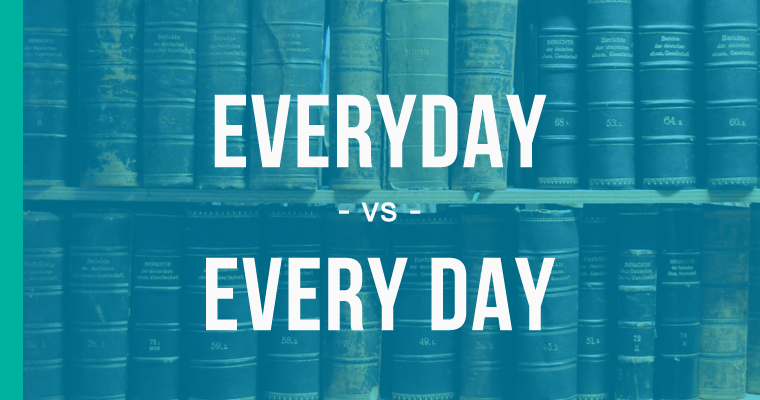Everyday vs. Every Day – How to Use Each Correctly

What’s the Difference Between Everyday and Every day?
Contents
Everyday and every day have the same meaning but they are different parts of speech. This means that they have different grammatical rules and can never be interchanged.
Everyday is an adjective that describes something that occurs daily.
- The toddler’s screaming fits were an everyday occurrence, unfortunately.
Every day is a noun phrase. It means each day.
- The athlete runs every day from 8AM to 9AM.
Now, let’s go over a few ways to use this word and phrase correctly.
Using Everyday in a Sentence
When to use everyday: Everyday is an adjective that describes an event that occurs daily.
For example,
- These shoes aren’t anything special. I use them as my everyday pair.
- It’s common to see cardinals in my backyard. In fact, it’s an everyday occurrence.
There are some common expressions and collocations that use everyday:
- everyday life: normal life with nothing out of the ordinary
- Most people don’t experience emergencies in their everyday life. Rather, emergencies occur rarely.
- everyday activities: activities that happen daily
- Soccer is an everyday activity in this household. On the days the kids don’t have practice, they play with their neighbors in the backyard.
- everyday use: able to be used on a daily basis
- This washing machine wasn’t designed for everyday use. It broke before we even had it for one year.
In addition to meaning daily, everyday can also refer to days that aren’t special. This means, for example, days that aren’t holidays.
Using Every Day in a Sentence
When to use every day: Every day is a noun phrase that is synonymous with each day.
For example,
- It is important to drink eight cups of water every day.
- If you stay in bed too long every day you will start to lose your health.
Every day gives information about time. When it acts as a descriptor of the time it usually appears at the beginning or end of a clause, rather than the middle:
- I run every day and sleep every night. (at the end of the clause I run)
- Every day, the sun rises and she wakes up to go to school. (at the beginning of the clause the sun rises)
This usage shows every day functioning as an adverb phrase.
Remembering Everyday vs. Every day
There is one easy way to remember which word to use and when.
Remember that every day is synonymous with each day. Both of these expressions consist of two different words.
Whenever you are unsure of whether to use everyday or every day, try substituting the expression each day. If it makes sense, use every day. If it looks or sounds wrong, you should use everyday.
Outside Examples
- In our everyday encounters, how we respond to others is determined by how we respond to them emotionally. Verbal cues — the words we string together in spoken utterances — are only part of the story. –New York Post
- Designers have churned out deceptively simple pieces to solve everyday problems. Although these introductions firmly embrace utility, they maintain a refreshing air of flair and whimsy. –Denver Post
- “I drink water all day. Between water and food, it’s driving me crazy,” Snyder said. “They give me X-number bottles of water every day, and I’ve had more water in the last four months than I’ve ever had in my entire life. I’ve also had more food placed in front of me in the same time period.” –The Washington Post
- I wake up every day and say, ‘I’m grateful to have a chance to play. I’m healthy. And just let it fall into place. –Houston Chronicle
Quiz: Every day vs. Everyday
Instructions: Fill in the blanks with the correct word or phrase, either every day or everyday, in the correct form.
- If you want to do a good job on the standardized test it is very important to study __________________.
- She screams ___________________ for incomprehensible reasons because she is grumpy and tired all the time.
- This car was designed for ________________ use. It can withstand all types of weather and bad road conditions, as well as higher than average daily distances.
- She wasn’t surprised when her boss yelled at her for no reason. On the contrary, this was an __________________ occurrence.
- Waking up early, drinking a kale smoothie, and doing 100 situps and 50 pushups was all part of his ___________________ routine.
See answers below.
Article Summary
Should I use everyday or every day? The two spellings sound the same and have the same meaning. However, they are different parts of speech, so they follow different grammatical rules.
- Everyday is an adjective that describes something that happens daily.
- Every day is an adjective and noun together that form a phrase. Usually this phrase functions as an adverb. Use it anytime you could use each day.
Understanding the grammar of both everyday and every day can help you keep them each straight.
Answers
- every day
- every day
- everyday
- everyday
- everyday
